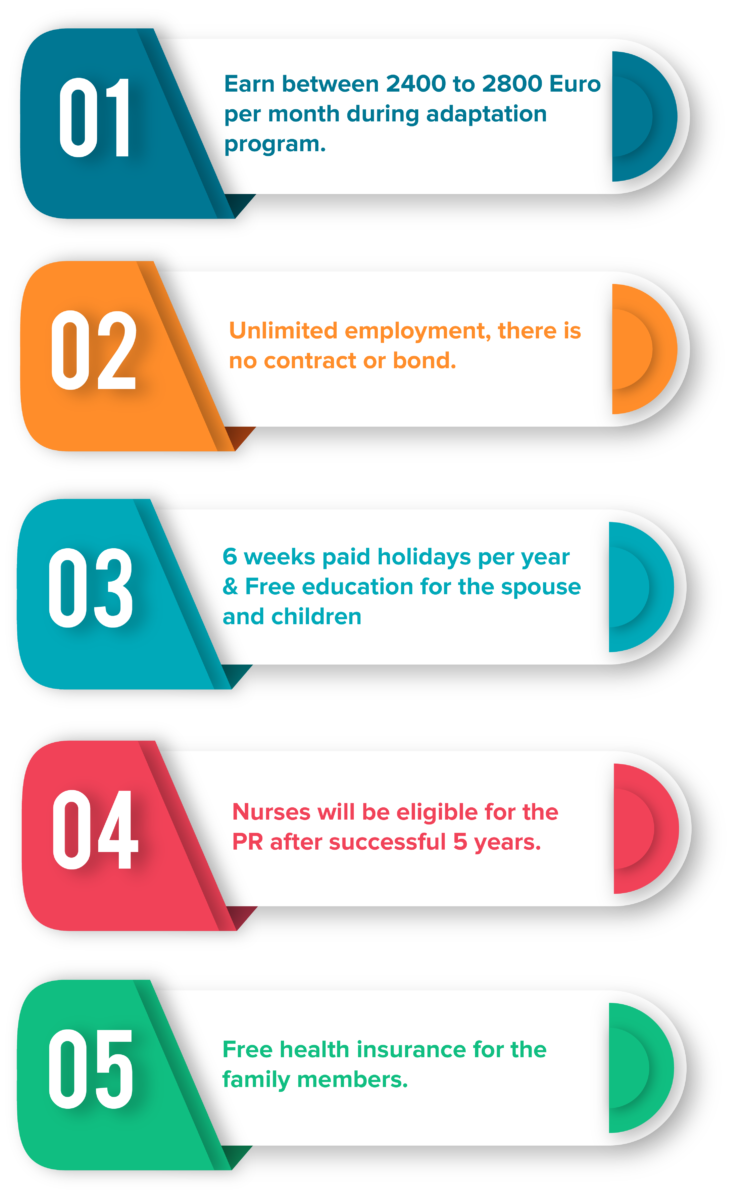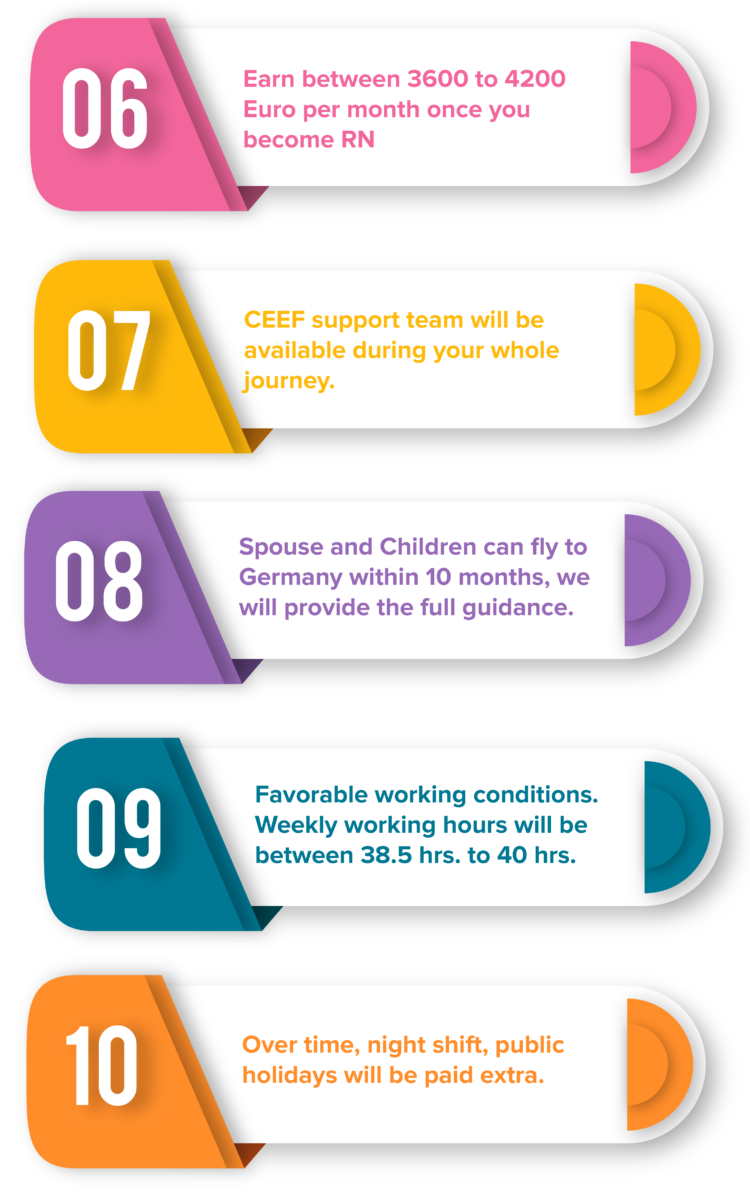
Health Practitioners
At CEEF, we aim to equip our students with the skills to explore the world and lead fulfilling lives, enabling them to earn for themselves and their families.
There is an unprecedented requirement for a professional workforce on the European continent, where the population numbers are staggeringly dwindling. This is more visible in the healthcare sector than in any other. Nurses, doctors, dentists, and pharmacists are in high demand in European nations such as Germany, Italy, Spain, and others. CEEF plays a crucial role in bridging this gap by tapping into Kerala’s resource pool.
CEEF has a long track record of sending qualified nurses and other healthcare professionals to European countries. Germany, in particular, has more than 200 specialist programs where healthcare professionals can sign up for more courses to enhance their chances of getting a job in hospitals, nursing homes, and other care facilities.
Nursing
Benefits of being a Nurse in Germany.



Entry Requirements for Indian Nursing Professionals
Official authorisation is required to work in the nursing profession in Germany on a long-term basis. CEEF does all due diligence, paperwork, and document verifications for free.
The following are the requirements to work in Germany:
The competent authority will check whether your professional qualification is equivalent to German qualifications. If this is not the case, you could take an assessment test or undergo an adaptation period to prove an equivalent level of knowledge. The German professional recognition obtained is valid nationwide. Both experienced and non-experienced professionals can apply for work permits.
Depending on the state, you must be competent at a level equivalent to the B1 or B2 levels. The embassy accepts a German language certificate from Goethe, ÖSD, or ECL. However, we strongly recommend passing level B2 before departure to Germany.
You must prove through a certified doctor that you are physically and mentally fit and are, therefore, suitable for a job in the nursing profession.
You will require proof that you do not have a criminal record to prove your trustworthiness. Depending on your situation, providing a certificate of good conduct from your previous employer or the nursing council is sufficient.
The age for applying as a Nurse in Germany is capped at 42.
Salaries in Germany:
Highest Annual Salary
€60,000
Average Annual Salary
€45,000
Lowest Annual Salary
€30,000
Learn more about a Nursing Career in Germany
Doctors, Dentists and Pharmacists
Official authorisation is required to work as a doctor, dentist, or pharmacist in Germany. The same is called approbation or a professional permit. All due diligence, paperwork, and document verifications are free at CEEF.
Doctors and Dentists can find jobs in hospitals, clinics, and health authorities. Combining academics with their professional degree is possible, as Germany encourages doctors and dentists to take positions in Universities and Research Institutes.
Pharmacists also have excellent working avenues, as Germany is home to many pharmaceutical giants. Consulting companies, too, require pharmacists on their payroll. In Germany, one can also become a teacher at a University or a pharmacist at a Point of Sale [Retail Store].
The following are the requirements to work in Germany:
Upon verifying your documents and certifications, the concerned authorities in each state will grant you a license to practise your profession.
Recognition of the medical diploma is regardless of your nationality and residence status.
Depending on the state, you must be competent at a level equivalent to the B1 or B2 levels. The embassy accepts German language certificates from Goethe, ÖSD, or ECL. However, we strongly recommend passing level B2 before departure to Germany.
Interested in a medical career in Germany?

Engineers
At CEEF, we aim to equip our students with the skills to explore the world and lead fulfilling lives, enabling them to earn for themselves and their families.
There is an unprecedented requirement for a professional workforce on the European continent, where the population numbers are staggeringly dwindling. This is more visible in the healthcare sector than in any other. Nurses, doctors, dentists, and pharmacists are in high demand in European nations such as Germany, Italy, Spain, and others. CEEF plays a crucial role in bridging this gap by tapping into Kerala’s resource pool.
CEEF has a long track record of sending qualified nurses and other healthcare professionals to European countries. Germany, in particular, has more than 200 specialist programs where healthcare professionals can sign up for more courses to enhance their chances of getting a job in hospitals, nursing homes, and other care facilities.
The following are the requirements to work in Germany:
A Bachelor’s or Master’s degree in Engineering from a recognised university is required to work in Germany. For specific engineering roles, a PhD may be advantageous or required.
Engineers in Germany often need to have their foreign qualifications recognised. This process, called “Anerkennung,” involves having your degree evaluated and accepted by German authorities.
Depending on the state, you must be competent at a level equivalent to the B1 or B2 levels. The embassy accepts German language certificates from Goethe, ÖSD, or ECL. However, we strongly recommend passing level B2 before departure to Germany.
Although some positions demand previous work experience, having practical experience through internships, work placements, or prior job roles is highly beneficial to better your chances.
Depending on the field, additional certifications in specific technologies, software, or methodologies (like CAD, SAP, or Lean Six Sigma) may be required or highly beneficial.